Employer Rejection Letter After Interview
[Your Name]
[Your Title]
[Your Company]
[Company Address]
[City, State, Zip Code]
[Email Address]
[Phone Number]
[Date]
[Applicant's Name]
[Applicant's Address]
[City, State, Zip Code]
Dear [Applicant's Name],
I hope this letter finds you well. On behalf of [Your Company], I want to extend my sincere gratitude for taking the time to interview for the [Position Title] role. We were truly impressed by your qualifications, experience, and the thoughtful insights you shared during the interview process.
After careful consideration and review of all candidates, we regret to inform you that we have decided to proceed with another candidate for the [Position Title] position. Please understand that this decision was not made lightly and was based on a combination of factors, including the skills and experience required for the role, as well as the overall fit within our team and company culture.
We genuinely appreciate your interest in joining [Your Company] and want to assure you that your application was thoroughly reviewed and considered. Your accomplishments and background are impressive, and we have no doubt that you will find success in your future endeavors.
We will keep your resume on file for future opportunities that may arise within [Your Company]. If you're open to it, we may reach out to you should a suitable position become available that aligns with your skills and experience.
Once again, thank you for your interest in [Your Company] and for investing your time and effort in our interview process. We wish you the very best in your job search and in all your future professional pursuits.
Should you have any questions or wish to receive feedback on your interview, please don't hesitate to reach out to us.
Sincerely,
[Your Name]
[Your Title]
[Your Company]
Professional Employer Rejection Letter
Subject: Interview Outcome – [Job Title]
Dear [Candidate Name],
Thank you for taking the time to interview for the [Job Title] position at [Company Name]. After careful consideration, we regret to inform you that you have not been selected for the role.
We appreciate your interest in our company and encourage you to apply for future openings that match your skills and experience.
Sincerely,
[Hiring Manager Name]
[Company Name]
[Contact Information]
Casual Email Rejection After Interview
Subject: Update on Your Interview – [Job Title]
Hi [Candidate Name],
Thank you so much for interviewing for the [Job Title] position at [Company Name]. We’ve completed our selection process and, unfortunately, we will not be moving forward with your application.
We wish you all the best in your job search and hope you find a great opportunity soon.
Best regards,
[Hiring Manager Name]
Formal Rejection Letter With Feedback
Subject: Interview Result – [Job Title]
Dear [Candidate Name],
We appreciate your interest in the [Job Title] position and the effort you put into the interview process. After careful review, we have decided not to proceed with your candidacy at this time.
While your experience is impressive, we have chosen a candidate whose qualifications more closely match the specific requirements of the role. Thank you again for your time and interest in [Company Name].
Sincerely,
[Hiring Manager Name]
[Company Name]
Provisional Rejection Pending Reference Check
Subject: Interview Status – [Job Title]
Dear [Candidate Name],
Thank you for attending the interview for the [Job Title] position. Your application is currently under final review, and some aspects are pending verification. At this point, we may not be able to offer you the position.
We will update you once the review process is complete.
Sincerely,
[Hiring Manager Name]
Heartfelt Rejection Letter
Subject: Interview Outcome – [Job Title]
Dear [Candidate Name],
We want to sincerely thank you for interviewing for the [Job Title] role. After much consideration, we regret to inform you that we have selected another candidate for this position.
We truly appreciate your interest in our company and hope you will consider applying for future opportunities. We wish you every success in your career journey.
Warm regards,
[Hiring Manager Name]
[Company Name]
Quick Rejection Email
Subject: Interview Outcome – [Job Title]
Hi [Candidate Name],
Thank you for your time and interest in [Company Name]. We have decided not to move forward with your application.
Best wishes for your job search,
[Hiring Manager Name]
Official Rejection Letter Complying With HR Policies
Subject: Interview Result Notification – [Job Title]
Dear [Candidate Name],
Thank you for attending the interview for the [Job Title] position. After a comprehensive review, we regret to inform you that we will not be offering you the position. This decision is consistent with our HR policies and equal opportunity guidelines.
We appreciate your interest in [Company Name].
Sincerely,
[HR Manager Name]
[Company Name]
[Contact Information]
What is an Employer Rejection Letter After Interview and Why It is Used
An employer rejection letter after interview is a formal communication sent to candidates who were interviewed but not selected for a job.
Purpose:
- To provide closure to applicants.
- Maintain professional communication and goodwill.
- Document recruitment decisions for HR records.
Who Should Send an Employer Rejection Letter
- Hiring managers responsible for the recruitment process.
- HR representatives overseeing candidate communications.
- Recruiters acting on behalf of the company.
Whom Should the Letter Be Addressed To
- The candidate who attended the interview.
- Co-applicants if multiple individuals were considered together.
- Recruiting agencies or representatives when applicable.
When to Send an Employer Rejection Letter
- After completion of all interviews.
- Once a final candidate is selected for the position.
- Promptly to ensure candidates are not left waiting unnecessarily.
How to Write and Send an Employer Rejection Letter
- Use a clear and respectful subject line.
- Address the candidate politely.
- State the decision in clear, neutral language.
- Optionally provide general feedback without discriminatory or overly detailed specifics.
- Close with appreciation and encouragement to apply in the future.
- Send via email, postal mail, or applicant tracking system (ATS).
Requirements and Prerequisites Before Sending
- Completion of all interview assessments.
- Finalization of candidate selection.
- Ensure wording complies with HR policies and employment laws.
- Prepare records for documentation.
Formatting and Tone Guidelines
- Length: One to three short paragraphs.
- Tone: Professional, empathetic, and neutral.
- Wording: Respectful, concise, non-discriminatory.
- Mode: Email, printed letter, or ATS notification.
- Include company name, sender name, and contact details.
Common Mistakes to Avoid in Employer Rejection Letters
- Using negative or harsh language.
- Delaying communication, causing frustration.
- Giving overly specific reasons that could imply bias.
- Failing to include contact information or polite closing.
Elements and Structure of an Employer Rejection Letter
- Subject line clearly indicating interview outcome.
- Salutation addressing the candidate.
- Statement of non-selection.
- Optional general feedback.
- Polite closing and encouragement to apply for future roles.
- Contact information for inquiries.
FAQ About Employer Rejection Letters After Interview
Q: Should I provide feedback to candidates?
A: General feedback is acceptable; avoid specifics that could lead to legal issues.
Q: How soon should rejection letters be sent?
A: As soon as possible after the decision to respect the candidate’s time.
Q: Is email acceptable?
A: Yes, email is standard, but printed letters may be preferred for senior positions.
Tricks and Tips for Sending Rejection Letters
- Keep the tone empathetic yet professional.
- Avoid negative language or detailed critiques.
- Provide encouragement for future applications.
- Document the letter for HR records.
- Confirm delivery if needed, especially for sensitive roles.
After Sending / Follow-Up Actions
- Maintain a copy in the recruitment files.
- Respond politely to candidate queries.
- Ensure HR compliance and fair treatment.
- Avoid engaging in disputes regarding the decision.
Pros and Cons of Sending an Employer Rejection Letter
Pros:
- Provides closure and professional courtesy to candidates.
- Protects the company by documenting communication.
- Maintains a positive reputation for the hiring process.
Cons:
- Must be carefully worded to avoid potential legal issues.
- May generate follow-up inquiries or requests for feedback.
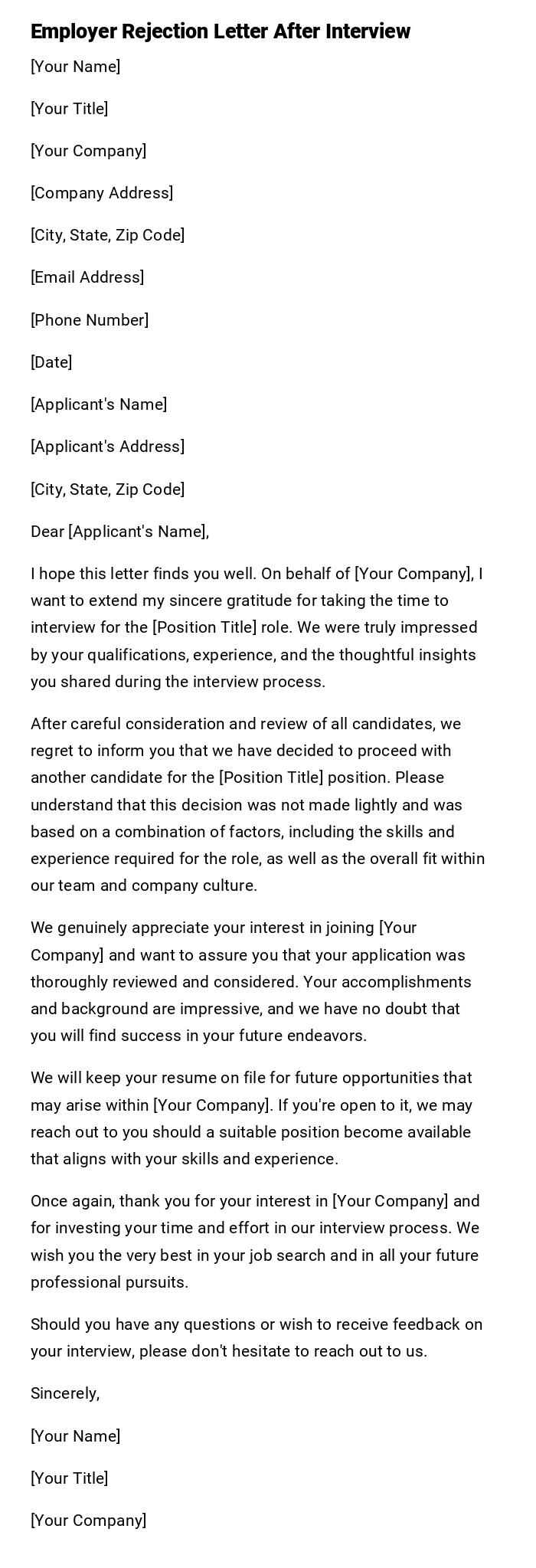
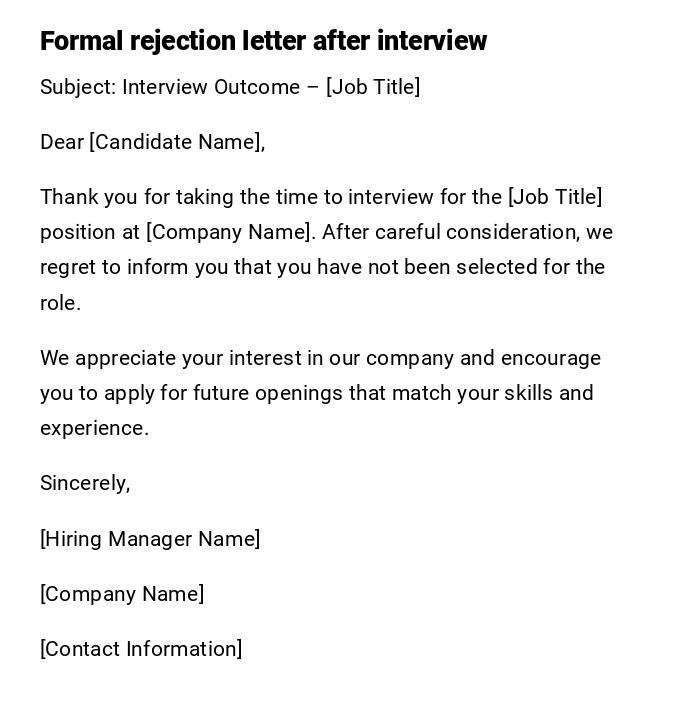
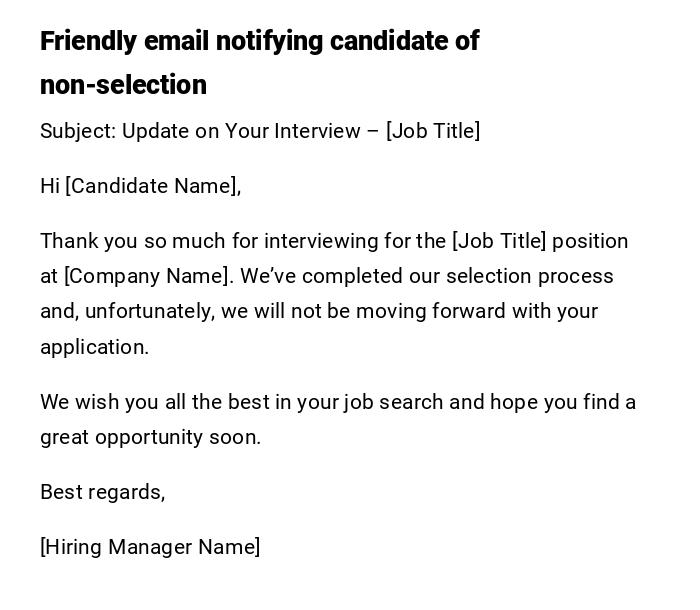
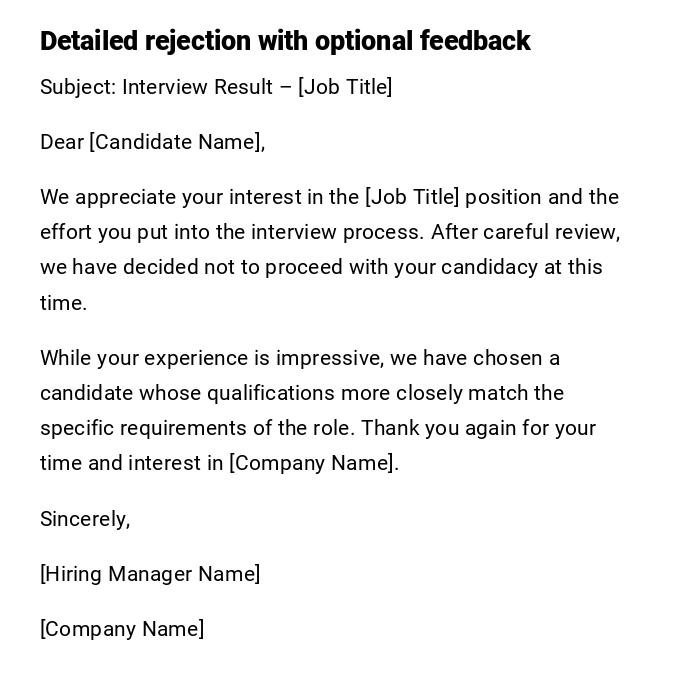
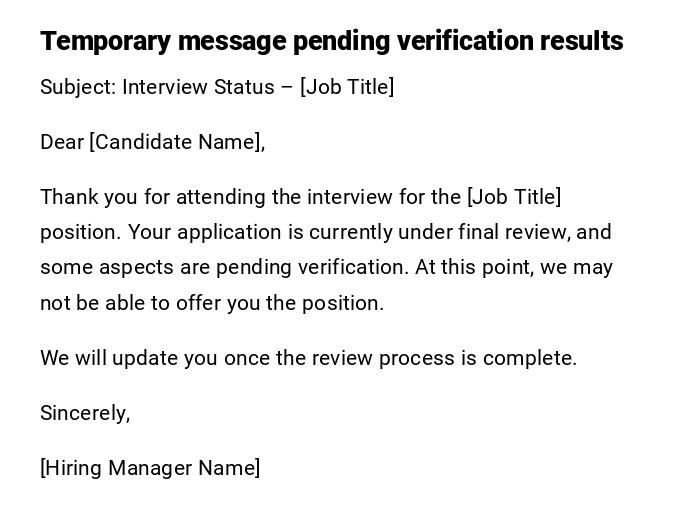
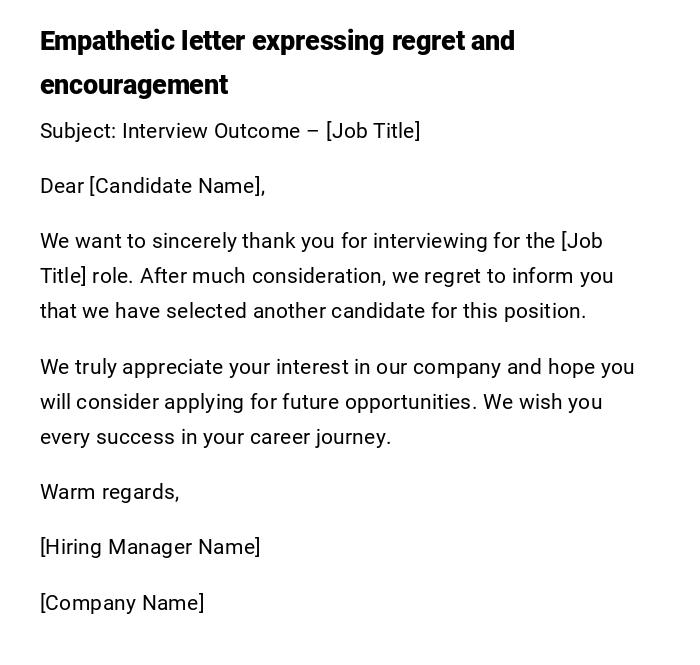
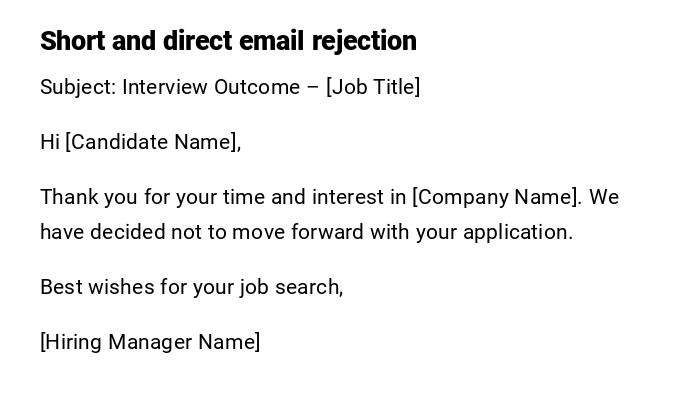
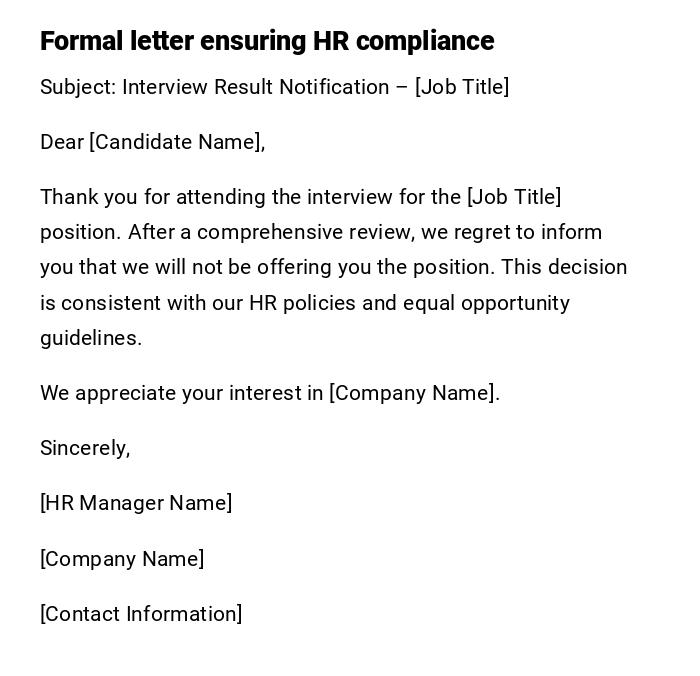

 Download Word Doc
Download Word Doc
 Download PDF
Download PDF